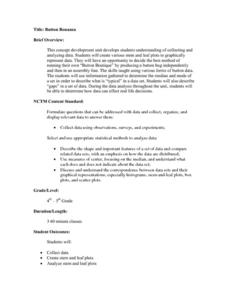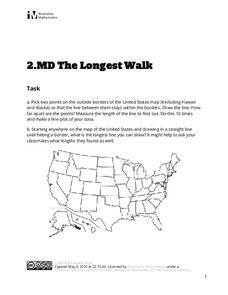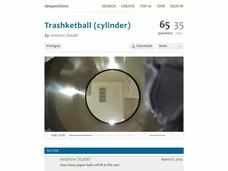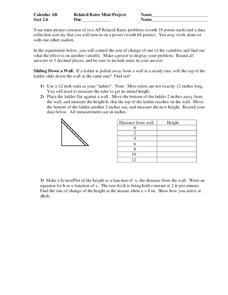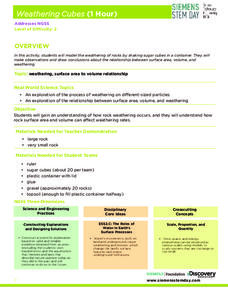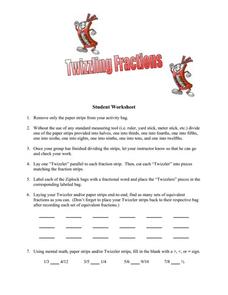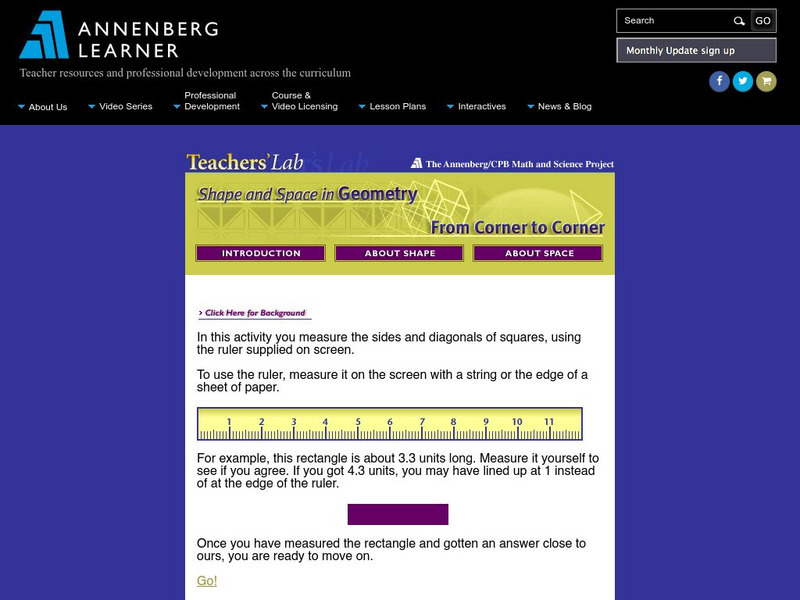Illustrative Mathematics
Hand Span Measures
How long is your hand span? Young mathematicians measure their hand span from pinky tip to thumb tip using a centimeter ruler. After rounding to the nearest whole centimeter, learners plot their data on a line plot.
Virginia Commonwealth University
General Construction Measurement and Dimensions
Learners construct their understanding of measurement and dimensions in this step-by-step approach that begins with an all group vocabulary introduction, consisting of measuring objects and dialoging using measurement vocabulary....
Illustrative Mathematics
Are These Right?
Is that a right triangle or a wrong triangle? Young mathematicians look at eleven different shapes and use a measuring tool of their choice to determine which triangles have right angles. Consider cutting out sets of the shapes to...
Curated OER
Button Bonanza
Collections of data represented in stem and leaf plots are organized by young statisticians as they embark some math engaging activities.
Illustrative Mathematics
Who is the Tallest?
A simple question, with a not-so-simple answer. Working with whole and mixed number measurements in inches, feet, and yards presents a problem with many possible solutions. A great activity that challenges the minds of young...
Illustrative Mathematics
The Longest Walk
How long of a line can you draw within this activity? Learners pick two points outside and within the map to create the longest line they can. After drawing 10 lines, learners plot the length of each line on a line plot. Then they...
Teacher's Corner
What Is a Foot?
An in-class and at-home assignment, young math stars find and list items from home and school that they think are one foot in length. Once the list is made, provide everyone with rulers to measure and find the actual lengths of their items.
Curated OER
How Big is a Foot?
Introducing measurement can be as simple as reading a book and then using measurement tools to understand how big a foot really is. The class reads and discusses the book How Big is a Foot? by Rolf Myller, stopping often to consider...
101 Questions
Trashketball
Take a shot using a lesson on volume! Young learners watch a video showing a trashcan filling with paper balls. The task is to calculate the number of paper balls that will fit in the can. Pupils use volume calculations to make a...
Exploratorium
Tired Weight
You don't need a scale to determine weight. This activity provides a way to use the concepts of air pressure and surface area to determine the weight of a vehicle by calculating the amount of weight each tire supports.
Exploratorium
Tired Weight
Take your class out to visit your automobile and use the tires to compute the weight of the vehicle. This is done by measuring the surface of the tire meeting the ground and the air pressure. This is a fun lesson in the relationship...
Houston Area Calculus Teachers
Related Rates
Use a hands-on approach to exploring the concepts of related rates in your AP Calculus class. Individuals explore the effect of the rate of change on a variable related to a variable they control. After analyzing the data they...
Curated OER
Cartography Project
A lesson involving mapping, the use of a compass, writing and following directions, and exploring the first two themes of geography is here for you. Learners create original maps that show the routes they take through their own...
Curated OER
Water Down the Drain
Did you know that leaky faucets waste $10 million worth of water? Conservationists perform an experiment and draw best-fit lines to explore how the US Geological Society determined this value.
101 Questions
Ants Marching
Your classroom will be rockin' during an toe-tapping lesson! Dave Matthews inspires a lesson on proportions as youth listen to a song and predict its length. Lesson materials provide learners with ordered pairs that mark the time slider...
Illustrative Mathematics
Dilating a Line
High School geometers verify through experimentation certain properties about dilations. This multi-step problem challenges them to construct examples of dilations to verify specific facts, the final step provides an opportunity to more...
Discovery Education
Weathering Cubes
Weathering is not necessarily a result of the weather. Scholars conduct an experiment to explore the effect of surface area and volume on the weathering process. They create their own sugar cube rocks using the same number of cubes—but...
Curated OER
Twizzling Fractions
In this fraction worksheet, students use twizzlers to demonstrate various equivalent fractions. Students complete ten greater than, equal to, and less than questions.
Teach Engineering
Glue Sticks Bend and Twist
Stick this resource in the "Use" column. In the second installment of a six-part series, learners use glue sticks to demonstrate forces. Using glue sticks, instructors can demonstrate tension, compression, and torsion.
Scholastic
Scholastic Lesson Plan: New Way to Measure Area
This article describes a new approach to teaching children more than just memorizing a formula to find area and hope they don't confuse it with perimeter. This approach involves a project with real life situations....
Math Open Reference
Math Open Reference: Constructions
Learn about drawing shapes using only a compass and straight edge or ruler with out measuring any lengths or angles.
Texas Instruments
Texas Instruments: Math Today When a Ruler Isn't Enough
This activity illustrates a real-life problem that uses trigonometry to solve for an unknown. students can use trigonometric ratios and inverse trigonometric relationships to determine the side of a triangle and the measure of the...
Annenberg Foundation
Annenberg Learner: From Corner to Corner
Measure the lengths and diagonals of three squares with a ruler. Look over your measurements and try to come up with a rule of thumb for estimating the length of a diagonal if you know the length of a side.
Math Is Fun
Math Is Fun: Using a Protractor
Students learn how to construct and measure angles using a protractor and ruler. The resource consists of a video demonstration and exploration activity.



